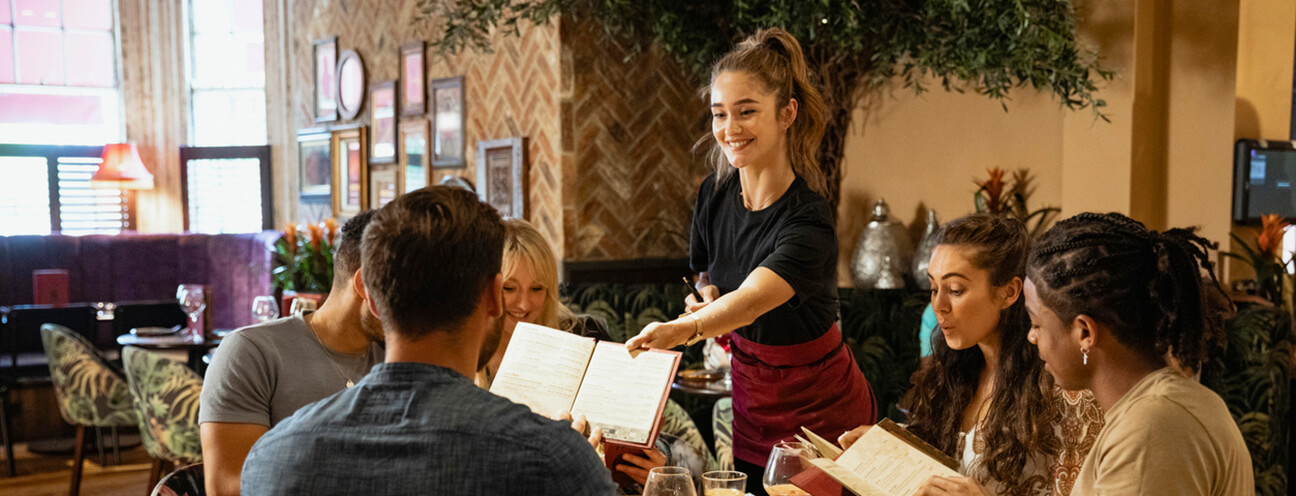It’s no secret that consumers are back out into the world and resuming their favorite pastime: dining out. In fact, 40% said they have already resumed dining out the way they did before the pandemic. Travel, whether for personal leisure or business, has also picked back up, giving hotels a unique opportunity to prioritize their food and beverage experiences to attract more guests and offer them incredible experiences.
Today, guests want experiences that are unique, personalized and engaging—not mass-produced. So, how can hotels broaden the impact of F&B to be a significant revenue and loyalty driver?
Data, data, data
Every guest wants to feel known and appreciated, and collecting and sharing guest data across properties is crucial to driving loyalty. Imagine a world where a guest is greeted by name at an F&B outlet at your Chicago property, their favorite cocktail is waiting for them along with a nut-free menu and they are thanked for being a Platinum member. Then, they go to your San Francisco location and receive the same caliber of personalized hospitality.
Curating thoughtful, highly personalized experiences enables your brand to increase loyalty and, ultimately, a higher lifetime value per guest.
Exclusive events and tasting menus
When COVID-19 hit in early 2020, overnight hotel stays decreased, as did on-site dining, resulting in a 66.5% decrease in overall F&B revenue per available room. Now, hotels can utilize their food and beverage outlets to create exclusive events or tasting menu experiences for diners to enjoy, whether they’re staying at the hotel overnight or not.
Hosting a multi-course wine pairing dinner or selling tickets for a rooftop igloo dining experience can be a great revenue driver. Plus, you can utilize your guest F&B data to further target your marketing, like inviting those who have ordered high-priced wines to an exclusive wine dinner.
Don’t forget the locals
More than a quarter of Americans think hotels should engage more with locals through their bars and restaurants. An often overlooked segment, locals can offer a consistent additional revenue stream and strong brand loyalty. By gathering critical data on their preferences when dining, operators can influence a hotel’s broader F&B strategy in the future—everything from favorite menu items to payment and reservation preferences.
Guest data on your locals is also a powerful tool to use in your marketing. An automated “thank you” from the restaurant’s general manager or a “We Miss you” email with an offer for those who haven’t dined with you in 60 days is an easy way to stay top of mind with your guests. Locals are an important customer to cultivate. With nearly 1 in 4 Americans agreeing that if a hotel in their area has unique and diverse food and beverage options, they’re more likely to consider booking with the same brand when traveling.
With the world adjusting to a new normal, hotels have a unique opportunity to leverage all their amenities to their fullest, unleashing the revenue potential of their food and beverage outlets. Collecting and leveraging guest data through in-person interactions and marketing automation, curating unique events and experiences and tapping into a local audience are just a few ways to drive more revenue and repeat business for your hotel.
“People love to go to try new places, but they are also creatures of habit. Show them a great time, make them feel at home, and be authentic, and you’ll create a regular,” said Erika Thomas, senior communications & marketing manager, EAST Miami
You can access the full whitepaper this content was derived from here: “Hotel F&B: Local Marketing – Unleash the Revenue Potential of Locals.”
About SevenRooms
SevenRooms is a guest experience and retention platform that helps hospitality operators create exceptional experiences that drive revenue and repeat business. From neighborhood restaurants and bars to international, multi-concept hospitality groups, SevenRooms is transforming the industry by empowering operators to take back control of their businesses to build direct guest relationships, deliver exceptional experiences and drive more visits and orders, more often.


